No products in the cart.
Education Agenda for New Government 2019
Universalisation of primary-secondary education would establish the rule of reason over emotion and empower citizens of the world’s most populous democracy to appreciate the profound logic of the Gandhian prescription of religious harmony, caste and gender equality and development of self-respect in all Indians, to reap the country’s much-awaited demographic dividend – Dilip Thakore
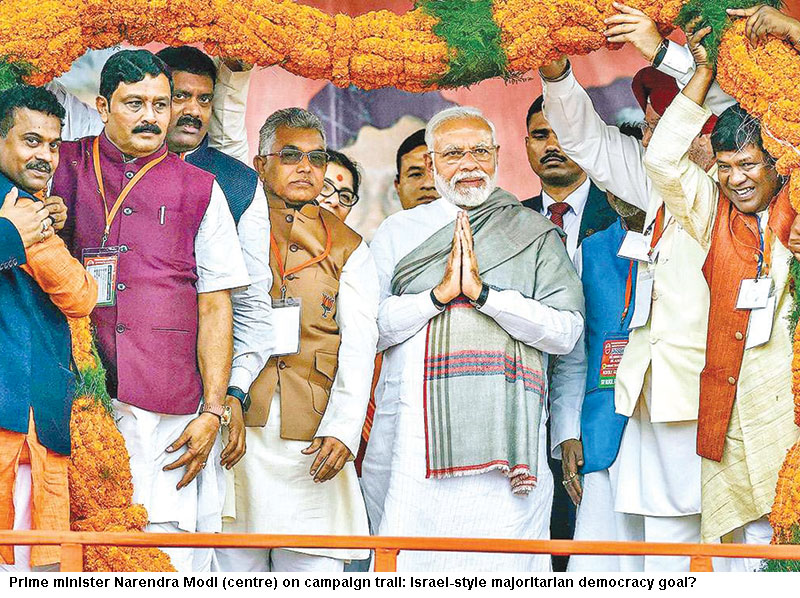
With the Election Commission having announced the dates for General Election 2019 — polling will begin in the states of Uttar Pradesh, Maharashtra, J&K, West Bengal, Andhra Pradesh and Bihar on April 11 and end in the states of Madhya Pradesh, Jharkhand and Punjab on May 19 with final results scheduled to be declared on May 23 — the bell has clanged for the final lap of a crucial election likely to re-orient the future trajectory of the world’s most populous democracy. If the incumbent Bharatiya Janata Party (BJP), which won a landslide victory in General Election 2014 with an absolute majority in the Lok Sabha in its own right, is returned to power in New Delhi, the hitherto secular, liberal character of post-independence India is certain to experience a makeover.
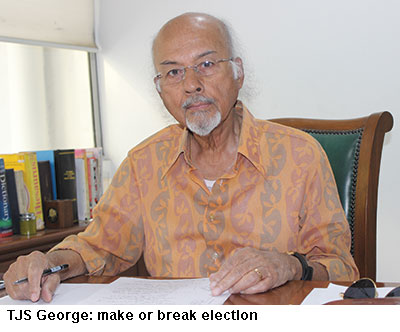 “This is going to be a make-or-break election. It will either make the idea of India viable, or it will break it completely. The ruling dispensation knows that if they don’t win this time, they won’t win for a long time. And if they win, they’ll make sure they don’t lose again. Get ready for the bitterest, most cold-blooded election in the history of our democracy,” writes veteran journalist T.J.S. George in the New Indian Sunday Express (March 17). Founder-editor of the Hong Kong-based Asiaweek and currently editorial advisor of the Chennai-based New Indian Express, in his long career (65 years), George has monitored every general election since India under the inspirational leadership of Mahatma Gandhi, wrested political independence from British rule in 1947.
“This is going to be a make-or-break election. It will either make the idea of India viable, or it will break it completely. The ruling dispensation knows that if they don’t win this time, they won’t win for a long time. And if they win, they’ll make sure they don’t lose again. Get ready for the bitterest, most cold-blooded election in the history of our democracy,” writes veteran journalist T.J.S. George in the New Indian Sunday Express (March 17). Founder-editor of the Hong Kong-based Asiaweek and currently editorial advisor of the Chennai-based New Indian Express, in his long career (65 years), George has monitored every general election since India under the inspirational leadership of Mahatma Gandhi, wrested political independence from British rule in 1947.
George’s apprehension about the outcome of the looming election is not alarmist rhetoric. During its two full terms (1999-2004 and 2014-19) in office at the Centre, the BJP has established beyond reasonable doubt that its goal is to transform 21st century India into a Hindu majoritarian democracy. While the pros and cons of realising this objective are being debated — it’s pertinent to bear in mind that 80 percent of India’s population is Hindu — attempted realisation of the BJP’s mission to transform India into an Israel-style democracy with an official religion, represents a radical U-turn from the secular consensus of post-independence India shaped by the Congress party which governed at the Centre and in most state capitals for over half a century since 1947.
 The secular governance guidelines delineated by Mahatma Gandhi, who transformed the elitist Congress into a mass-based political party which completely bamboozled the British Raj and forced its exit from the subcontinent, are brilliantly presented by contemporary historian Ramachandra Guha in his latest monumental oeuvre Gandhi: The Years that Changed the World (Penguin, 2018). “To deliver India from British rule was by no means Gandhi’s only preoccupation. The forging of harmonious relations between India’s often disputatious religious minorities was a second. The desire to end the pernicious practice of untouchability in his own Hindu faith was a third, and the impulse to develop economic self-sufficiency and moral self-reliance for Indians was fourth… For Gandhi political independence meant nothing at all unless it was accompanied by religious harmony, caste and gender equality and the development of self-respect in every Indian,” writes Guha in the preface of this 1,100-page tome of dedicated scholarship and research into the life, letters and ministry of this greatest Indian, appropriately revered as Father of the Nation.
The secular governance guidelines delineated by Mahatma Gandhi, who transformed the elitist Congress into a mass-based political party which completely bamboozled the British Raj and forced its exit from the subcontinent, are brilliantly presented by contemporary historian Ramachandra Guha in his latest monumental oeuvre Gandhi: The Years that Changed the World (Penguin, 2018). “To deliver India from British rule was by no means Gandhi’s only preoccupation. The forging of harmonious relations between India’s often disputatious religious minorities was a second. The desire to end the pernicious practice of untouchability in his own Hindu faith was a third, and the impulse to develop economic self-sufficiency and moral self-reliance for Indians was fourth… For Gandhi political independence meant nothing at all unless it was accompanied by religious harmony, caste and gender equality and the development of self-respect in every Indian,” writes Guha in the preface of this 1,100-page tome of dedicated scholarship and research into the life, letters and ministry of this greatest Indian, appropriately revered as Father of the Nation.
Broadly speaking, it is substantially true that the Congress party (estb. 1885) governed independent India according to the guidelines drawn by the Mahatma, even if economic growth of the newly emergent nation was shackled by the imposition of inorganic Soviet-inspired socialism upon the populace. Official religious neutrality was strictly observed by Congress governments and Hindu-Muslim harmony was a watchword of secular India which enforced Article 14 (equality before the law), Article 19 (the seven freedoms) and Article 30 (freedom of religious and linguistic minorities to establish and administer education institutions of their choice).
If at all, Congress leaned too much to the other side inasmuch as it ill-advisedly indulged orthodox Muslim ulema (clergy) rather than encouraging and empowering the educated Muslim middle class to protect the interests and apprehensions of post-independence India’s largest religious minority community (180 million).
This strategic error has cost the Congress electorally and facilitated the re-emergence of the Rashtriya Swayamsevak Sangh (RSS), the ideological mentor of the BJP which believes that independent India should be a Hindu majoritarian nation. Since the early 1990s when BJP stalwart L.K. Advani undertook a national rath yatra in a customised Toyota, alleging Congress’ pandering to the Muslim community, the BJP’s charge of Muslim “appeasement” has struck a resonant chord within millions of Hindus, enabling BJP-led alliances to form two governments (which served full five-year terms) at the Centre.
The moot point is that even the most ardent BJP supporter is unlikely to contest the proposition that this political party is least committed to governing the country within the Gandhian framework of “religious harmony, caste and gender equality”. In the circumstances, T.J.S George’s apprehension that the outcome of General Election 2019 could break the post-independence “idea of India completely”, is not unwarranted.
However, universalisation of primary-secondary education would establish the rule of reason over emotion and empower citizens of the world’s most populous democracy to appreciate the profound logic of the Gandhian prescription of religious harmony, caste and gender equality and development of self-respect in all Indians, to reap the country’s much-awaited demographic dividend.
Unfortunately despite the history of developed nation states around the world, notably the industrially advanced countries of the West and Japan in Asia conclusively establishing that universal primary, even if not secondary, education is the golden key that opens all doors leading to national socio-economic development, successive governments at the Centre and states (with the possible exception of Kerala) in independent India have failed and neglected to follow their example. Despite the high-powered Kothari Commission (1966) and the T.S.R. Subramanian Committee (2016) having urgently recommended that the annual national (Centre plus states) expenditure on public education should be raised to 6 percent of GDP (gross domestic product), it has averaged a mere 3.5 percent for the past 70 years since independence.
The impact of sustained under-funding and lax supervision of the country’s 1.20 million government schools for over seven decades has been devastating for national socio-economic development. The country’s population has tripled, 300 million adults are illiterate, learning outcomes in rural and government schools (tracked by the Annual Status of Education Reports of the Pratham Education Foundation) are rock-bottom, environment despoliation is galloping and industry and agriculture productivity is among the lowest worldwide. Unsurprisingly, unemployment — more accurately unemployability of deficiently schooled youth — is a way of life and the nation’s ill-educated electorate is easy prey to careerist divide-and-rule politicians and charlatans championing caste and community particularisms and harbouring atavistic religious antagonisms. This explains the rise of the BJP and regional parties practising caste calculation politics.
Against this darkening backdrop, the editors of EducationWorld (estb.1999), launched with the mission to “build the pressure of public opinion to make education the #1 item on the national agenda,” have been persistently advocating increase of national expenditure (Centre plus states) on education to 6 percent of GDP and suggesting ways and means to contemporise Indian education to improve learning outcomes in public and private institutions of learning from pre-primary to university level.
We believe it’s high time that education and human capital development is taken out of the realm of partisan politics and entrusted to an Education Commission of India, chaired by an eminent educationist with a reformist track record. Comprising representatives of the Union HRD ministry and the largest opposition party in the Lok Sabha, chairperson and general secretary of CBSE and CISCE boards, chairman of the University Grants Commission, and industry (FICCI/CII) and agriculture representatives, its first priority should be a new agenda incorporating the best features of a reportedly ready New Education Policy 2019 report steered by eminent space scientist K.
Kasturirangan. The Education Commission should be invested by Parliament with powers to regulate and adjudicate on all matters related to education from pre-primary to Ph D.
Meanwhile, even as a national consensus to constitute a non-partisan National Education Commission with wide powers to reform, supervise and adjudicate Indian education emerges, we outline some urgent reforms to chart a path towards renewal of all sectors of Indian education from preschool to university, for public consideration and debate.
Early Childhood Care and Education
Although several educationists such as Dr. Maria Montessori, Loris Malaguzzi (Reggio Emilia) and Rudolf Steiner (Waldorf) discovered the importance of kindergarten (‘children’s garden’ in German) to gradually and joyfully 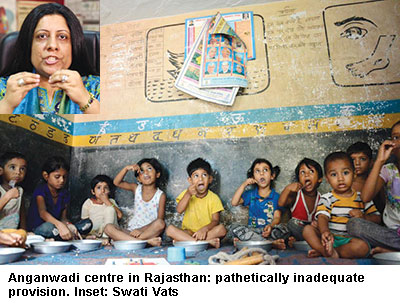 prepare children in the 3-5 years age group for further education in the first half of the 20th century, awareness of the importance of developing latent cognitive capabilities of even younger children in the 1-3 years age group has dawned upon educators more recently. With brain development and neuroscience research indicating that children’s cognitive capabilities develop very quickly and that their brain growth attains 90 percent of full capacity by age eight, educationists in the developed nations discovered the virtues of professionally administered early childhood care and education (ECCE) in the 1990s. One of the foremost proponents of formal ECCE was American economics Nobel laureate Dr. James Heckman whose research highlighted that a dollar invested in professionally delivered ECCE fetches higher socio-economic returns than dollars invested later in school and college education.
prepare children in the 3-5 years age group for further education in the first half of the 20th century, awareness of the importance of developing latent cognitive capabilities of even younger children in the 1-3 years age group has dawned upon educators more recently. With brain development and neuroscience research indicating that children’s cognitive capabilities develop very quickly and that their brain growth attains 90 percent of full capacity by age eight, educationists in the developed nations discovered the virtues of professionally administered early childhood care and education (ECCE) in the 1990s. One of the foremost proponents of formal ECCE was American economics Nobel laureate Dr. James Heckman whose research highlighted that a dollar invested in professionally delivered ECCE fetches higher socio-economic returns than dollars invested later in school and college education.
The editors of EducationWorld were awakened to the critical importance of ECCE in 2007 by Mike and Lowell Milken, promoters of the Los Angeles-based Knowledge Universe Inc which owns the largest chain of over 2,000 Kinder Care preschools in the US. In 2010, this publication began rating and ranking owned and franchised pre-primaries in major cities across India on several parameters of ECCE excellence (teacher competence, individual attention to children, parental involvement, safety and hygiene, infrastructure, innovative teaching etc), and also initiated the annual EducationWorld ECCE National Conference and Preschool Rankings Awards to debate new trends in ECCE and felicitate the most admired preschools in 16 cities countrywide.
EW’s persistent advocacy of ECCE has had socially beneficial outcomes. Membership of the Mumbai-based Early Childhood Association of India (ECA) has risen from 900 preschools in 2010 to 3,000 currently. Moreover in 2013, in its final days in office, the Union cabinet of the Congress-led UPA-II government approved a draft National Early Childhood Care and Education (NECCE) policy. Regrettably, the NECCE draft hasn’t received any traction during the five-year reign in Delhi of the BJP-led NDA government.
Yet the tragedy of formally-provided ECCE is that while urban middle class households are fairly well served by an estimated 300,000 private preschools across the country, 150 million children under age five are substantially deprived of this service. The only recourse of over 140 million underprivileged households are the 1.34 million anganwadi centres (AWCs) — essentially nutrition centres for lactating women and newly-born children which also provide rudimentary ECCE to children in the 0-5 age group.
However, government-run AWCs staffed by under-skilled women helpers, accommodate only 84 million of the 164 million children under-5 countrywide, leaving 80 million often severely malnourished infants, without proper care, nutrition and ECCE. The provision of Rs.19,834 crore in the Union budget 2019-20 for the 1.34 million AWCs is pathetically inadequate (Rs.1.42 lakh per AWC per year). Repeated pleas made to the Central and state governments by the Early Childhood Association, ECCE professionals and EducationWorld, which has repeatedly published resource mobilisation road-maps (see p.53) for public education, including ECCE, have not moved the establishment, academy or the educated middle class.
Addressing the EW ECCE National Conference 2018-19, convened in Bangalore by EducationWorld, Dr. Swati Popat Vats, president of the Early Childhood Association of India, lamented that the Central and state governments believe that professionally provided ECCE to youngest children is regarded as “a welfare initiative rather than economic imperative”. “For those who may wonder why private sector educators and middle class parents should worry or care about the quality of early childhood education being delivered in government-run anganwadis, I conclude with a quote from Lilian Katz, the highly-respected professor emerita of early childhood education at the University of Illinois, Urbana-Champaign: ‘I believe that each of us must come to care about everyone else’s children. We must begin to see that the well-being of our own individual children is intimately linked to the well-being of other people’s children. After all, when one of our children needs life-saving surgery, someone else’s child will perform it, when one of our children is threatened or harmed by violence in the streets, someone else’s child will inflict it. The good life for our own children can be secured if it is also secured for all other people’s children’.”
Primary Education
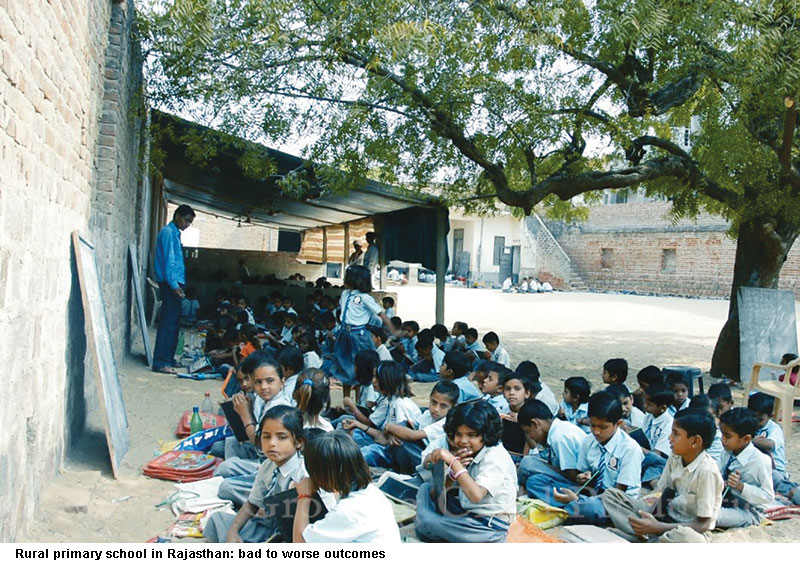
Although after the Sarva Shiksha Abhiyan (‘education for all’) programme was belatedly introduced in 2001, 98 percent of the country’s 250 million children in the 6-14 age group are in primary/elementary (class I-VIII) classrooms of the country’s 1.53 million schools at the beginning of every academic year, their learning outcomes are rock-bottom. For almost two decades, the globally respected Delhi/Mumbai-based Pratham Education Foundation (estb.1994) has been publishing its Annual Status of Education Report (ASER) — an invaluable compilation of learning measurement tests of children aged 6-14 from rural households in 586 (of total 725) districts of the country.
Every year, Pratham’s massive field force of over 30,000 volunteers (mainly college students) fan out across the country and test the competencies of primary school children in reading (vernacular and basic English) and arithmetic. The ASER surveys published every January report that for several reasons including dismal infrastructure, multi-grade classrooms, badly written textbooks, ill-trained teachers, routine infliction of corporal punishment and chronic teacher truancy, learning outcomes of children are going from bad to worse, especially in rural primary/elementary schools run by state governments.
For instance, the latest ASER 2018 released on January 15 reveals that the percentage of class V children in rural government schools who can read class II level textbooks has declined from 53.1 in 2008 to 44.2 percent in 2018. In the benighted state of Bihar (pop.110 million), the decadal decline is steeper — from 62.8 to 35.1 percent. In Madhya Pradesh, it’s even worse — from 86.8 in 2008 to 34.4 percent in 2018. Even in Kerala, the country’s most literate state, 27 percent of class V children in rural government schools cannot read class II texts, according to ASER 2018.
Learning outcomes in rural private schools are somewhat better — 65.1 percent of class V children can read class II texts (cf. 44.2 percent in government schools). And here’s the clincher: while in 2008, 83.6 percent of children in class VIII could read and comprehend class II level tests, ten years on, only 69 percent can do so, i.e, 31 percent of class VIII students poised to enter senior school, can’t manage class II textbooks.
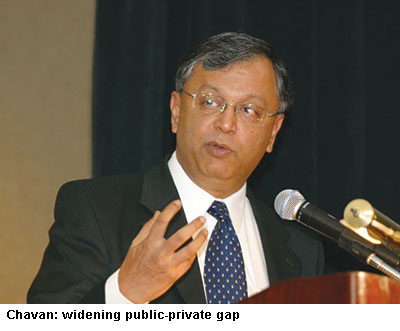 “The important thing to note is that in 2008, the percentage of class V children who could read class II level texts in government schools was 53 percent or 15 percentage points lower than the 68 percent in private schools. By 2018, this gap has widened to 21 percentage points on a national scale. At the same time, the proportion of children enrolled in private schools in rural India has gone up from 22 percent in 2008 to 30 percent in 2018,” says Madhav Chavan, an alumnus of Ohio State University who forsook a promising career in industry to promote Pratham 24 years ago to blow the whistle on India’s crumbling education system.
“The important thing to note is that in 2008, the percentage of class V children who could read class II level texts in government schools was 53 percent or 15 percentage points lower than the 68 percent in private schools. By 2018, this gap has widened to 21 percentage points on a national scale. At the same time, the proportion of children enrolled in private schools in rural India has gone up from 22 percent in 2008 to 30 percent in 2018,” says Madhav Chavan, an alumnus of Ohio State University who forsook a promising career in industry to promote Pratham 24 years ago to blow the whistle on India’s crumbling education system.
Moreover, judging by the arithmetic capabilities of India’s children in the 3-16 age group tested by Pratham volunteers, the global reputation Indians have for being maths geniuses will soon become history. According to ASER 2018, the percentage of children in class V of government schools who can do simple division sums has declined from 34.4 percent in 2008 to 22.7 percent. Worse, only 40 percent of class VIII children can solve simple three-digit-by-one-digit division sums, i.e, 60 percent can’t. The numeracy capability of students in rural private primaries is better, but not by much — 54.2 percent of class VII students can do division (down from 71.8 percent ten years ago).
These disturbing reports and more critically, reluctance to teach English — India’s link language and lingua franca of the upper judiciary — in state government schools, has prompted the mushroom growth of the country’s unique budget private schools (BPS). These are low-price professedly English-medium primary-secondaries established in slum colonies and street corners and nooks of urban and rural India — many of them officially ‘unrecognised’ — to which millions of low-income households, desperate for half-decent English medium learning are sending their children.
Typically, instead of improving and upgrading government schools, the left-liberal establishment’s response to this threat has been to outlaw BPS, whose number according to the Centre for Civil Society (CCS), a Delhi-based think tank, has risen to 400,000 with a staggering aggregate enrolment of 60 million children countrywide. S.19 of the landmark Right of Children to Free & Compulsory Education (RTE) Act, 2009 — drafted by the Congress party’s legal eagle and former Union HRD minister, Kapil Sibal — slyly outlaws budget private schools by stipulating impossible infrastructure norms for them.
However, under the leadership of CCS and NISA (National Independent Schools Alliance) and support from EducationWorld, BPS promoters have struck back obtaining stay orders from the courts against heavy monetary fines imposed on them and forcible closures. Moreover, commending BPS edupreneurs who have stepped forward to meet the demand for English-medium education from cruelly neglected low-income households, your editors have demanded freedom from persecution and soft loans from government for BPS promoters to improve their infrastructure standards to comply with s. 19.
Secondary & Higher Secondary Education
Due to continuously inadequate provision by Centre and the states, secondary education is a bottleneck segment of India’s public education system. Of the total number of 1.53 million schools (source DISE data (2016-17) of the National University of Educational Planning & Administration, Delhi) countrywide, the number of secondary schools is only 178,000 with an aggregate enrolment of 38.23 million (cf. the total number of 250 million children in primary education at the start of each academic year). This huge cohort dropping out of the primary (mainly government) school system, is not only indicative of parental and student disillusionment with the quality of education, but also insufficiency of secondary schools.
The number of higher secondary schools drops even more sharply to 33,996 with an aggregate enrolment of 17 million. Given that higher secondary education is a two-year study programme, barely 9 million youth per year enter the portals of higher education institutions. From 250 million in K-12 education at the start of every academic year to a mere 9-10 million filtering into higher education is human resource attrition of an unprecedented scale. With such a tiny proportion of educated citizens, it’s hardly surprising that assessed on every parameter of national development — under-five mortality, children’s health and education, human development indices, industrial and agriculture productivity, per capita income, the law’s delay and the 2018 United Nations’ National Happiness Index — 21st century India is ranked among the world’s most laggard nations.
But even as the political class continues to accord low priority to public education to enhance India’s huge pool of high-potential human resource, leading lights of the newly emergent tribe of education entrepreneurs (aka edupreneurs) are cutting through the red tape of education ministries at the Centre and in the states to establish globally-benchmarked private schools for the fast-expanding middle class. Although the hate objects of socialists, leftists and jholawallas, post-liberalisation India’s public-spirited edupreneurs practising enlightened self-interest offer hope of putting the country’s derailed education system back on track.
“With the Indian public even down to the poorest households clearly demonstrating preference for privately provided school education — over half of the country’s children are in private schooling which is available at all price points — it’s high time the logic of liberalisation and deregulation is applied in the education sector. Therefore it should become easier to promote private schools and governments at the Centre and in the states — and also examination boards — should confer greater operational autonomy to private institutions. They should be allowed to 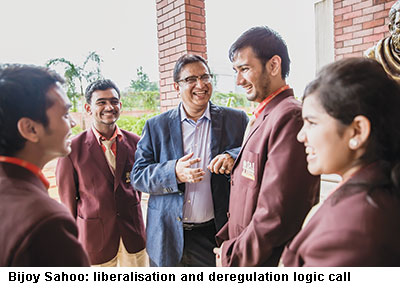 earn reasonable returns on investment, and school promoters should have easy access to capital markets and venture capital so that the supply-demand gap for high-quality K-12 schools is reduced. I also recommend establishing IIM-style Centres of Leadership, offering 6-12 month diplomas and postgrad degrees in school management. This will give a huge quality boost to school education,” says Bijoy Kumar Sahoo, who quit a successful chartered accountancy and business career to promote the Bhubaneswar-based, Sai International School (estb. 2008), ranked #3 in India and #1 in Odisha by EducationWorld in the category of co-ed day-cum-boarding schools.
earn reasonable returns on investment, and school promoters should have easy access to capital markets and venture capital so that the supply-demand gap for high-quality K-12 schools is reduced. I also recommend establishing IIM-style Centres of Leadership, offering 6-12 month diplomas and postgrad degrees in school management. This will give a huge quality boost to school education,” says Bijoy Kumar Sahoo, who quit a successful chartered accountancy and business career to promote the Bhubaneswar-based, Sai International School (estb. 2008), ranked #3 in India and #1 in Odisha by EducationWorld in the category of co-ed day-cum-boarding schools.
Another voice of deep academic scholarship combined with school management experience that should be seriously heeded is of Prof. Geeta Kingdon, chair of education economics and international development at the Institute of Education of University College London, and president of the City Montessori School, Lucknow (estb.1959), which with its 18 campuses in Lucknow and aggregate enrolment of 56,500 students, is acknowledged by Guinness World Records as the world’s largest K-12 school.
Prof. Kingdon recommends a three-prong strategy to lift school education in India out of the slough of despond in which it is mired. First, the school funding system needs an overhaul. She endorses direct benefit transfers (DBT) — much loved by the incumbent BJP/NDA government at the Centre — to households by way of school vouchers which would empower parents to enrol their children in government or private schools of their choice. Secondly, Kingdon recommends separation of the funding, provider and regulatory roles of government and thirdly, official focus on learning outcomes rather than infrastructure inputs. Moreover Kingdon warmly welcomes the proposal to establish an Education Commission to “insulate education from political or ideological football” and protect it from the “short-termism of five-year governments at the Centre and in the states” (see interview p.44)
Skills Education & Training
Right from the time India attained its independence, vocational education and training (VET) has been a low priority subject, an oversight flowing from British-style education which preferred the education of clerks rather than skilled workers. Nearly 250,000 traditional Indian gurukuls, where all youth (shishyas) were taught a skill by their gurus were shut down after Lord Macaulay issued his famous minute on education in British India (1835). Currently, a mere 3.5 million youth are enrolled in India’s 15,000 VET institutions (including 2,000 ITIs run by the Union ministry of labour), and only 3-5 percent of the country’s 480 million workers have formal VET certification.
In sharp contrast, 60 million youth are enrolled in China’s 500,000 VET institutions and an estimated 50 percent of its total labour force has received formal vocational education. Japan (pop. 126 million) hosts 150,000 VET institutes and Germany (pop. 182 million) has 100,000, whereas contemporary India (pop. 1.25 billion) hosts a mere 15,000. In 2007, the Congress-led UPA-I government established a National Task Force for Skills within the Planning Commission but the task force didn’t make much progress. In 2014 after the BJP-led NDA government was voted into office, a Union ministry of skills development & entrepreneurship was established. Since then, the number of VET institutes has increased from 6,000 to the current 15,000.
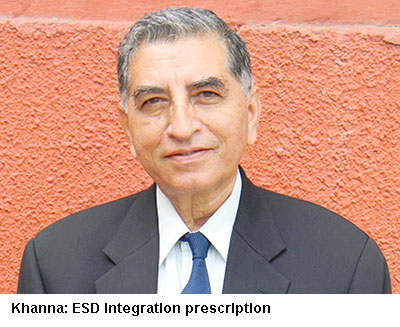 “In European Union countries, ESD (enterprise skills development) starts from class I and pre-vocational courses from class VIII, followed by formal vocational training in senior secondary school. Children above 14 years enrolled in VET courses simultaneously work as apprentices or trainees for three-four days per week in local small and medium-scale enterprises. Likewise, the imminent New Education Policy needs to introduce ESD in school classrooms and make skills development an integral part of school curriculums,” says Krishan Khanna, a graduate of IIT-Kharagpur with senior corporate experience in blue chip companies who dropped out of India Inc over three decades ago to transform into an indefatigable champion of VET.
“In European Union countries, ESD (enterprise skills development) starts from class I and pre-vocational courses from class VIII, followed by formal vocational training in senior secondary school. Children above 14 years enrolled in VET courses simultaneously work as apprentices or trainees for three-four days per week in local small and medium-scale enterprises. Likewise, the imminent New Education Policy needs to introduce ESD in school classrooms and make skills development an integral part of school curriculums,” says Krishan Khanna, a graduate of IIT-Kharagpur with senior corporate experience in blue chip companies who dropped out of India Inc over three decades ago to transform into an indefatigable champion of VET.
Currently, Khanna is the founder of i-Watch, a Mumbai-based think tank and foundation. “India needs to leapfrog into the VET arena by using artificial intelligence and digital technology, and ensure that all of the country’s 40,000 colleges and 33,996 higher secondary schools have at least one VET centre,” he adds.
Higher Education
Although India’s first modern universities of Bombay, Calcutta and Madras were chartered in 1857 and the ancient University of Nalanda (6th century BCE) attracted scholars from around the world, 21st century India’s 39,000 undergad colleges and 800 universities are in a shambles. Not one of them is ranked in the Top 200 World University Rankings league tables of the globally-respected London-based academia rating agencies Quacquarelli Symonds (QS) and Times Higher Education. The great majority of a mere 25 percent of youth in the 17-24 age group enrolled in higher education institutions (cf. 60 percent in OECD countries, 42 percent in China and 84 percent in Korea) receive sub-standard education which imposes arguably the highest induction and training cost worldwide on India Inc. According to Aspiring Minds, a Delhi-based personnel testing and recruitment firm, 70 percent graduates of India’s 3,400 engineering colleges and 85 percent of arts, science and commerce colleges are unemployable in Indian and foreign multinational companies.
The few islands of excellence in higher education are the eight premier IITs (Indian Institutes of Technology), the six top-ranked IIMs (Indian Institutes of Management) and 49 heavily subsidised Central government universities, and several newly established private universities (Manipal, Amity, Ashoka, Jindal Global, BITS-Pilani, Shiv Nadar etc). The latter have emerged as the favoured higher ed institutions of the country’s expanding middle class youth unable — who despite high marks and scores — are unable to secure admission into the handful of acceptable quality Central government universities, and were hitherto forced to sign up with expensive and exploitative universities abroad.
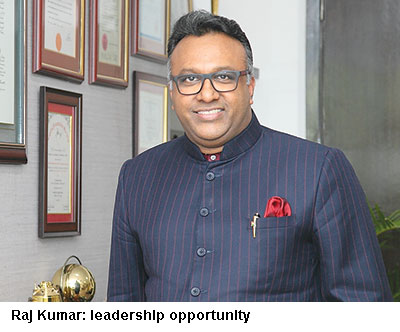 Dr. C. Raj Kumar, an alum of Madras, Delhi, Oxford, Harvard and Hong Kong universities and visionary founding vice chancellor of the privately promoted O.P. Jindal Global University, Sonipat, Haryana (estb. 2009) which has blazed a new, unprecedented trail to establish itself as India’s most international university (see EW cover story January 2019 on www.educationworld.in), believes that India’s “higher education system requires fundamental re-examination” and urgently needs to “focus on promoting quality and excellence”.
Dr. C. Raj Kumar, an alum of Madras, Delhi, Oxford, Harvard and Hong Kong universities and visionary founding vice chancellor of the privately promoted O.P. Jindal Global University, Sonipat, Haryana (estb. 2009) which has blazed a new, unprecedented trail to establish itself as India’s most international university (see EW cover story January 2019 on www.educationworld.in), believes that India’s “higher education system requires fundamental re-examination” and urgently needs to “focus on promoting quality and excellence”.
Invited by your correspondent to prescribe three top priority reforms for uplifting contemporary India’s languishing higher education system, Raj Kumar lists them as — a significant increase in funding of the higher education sector through public and private resources, especially for knowledge creation and developing a strong research culture; regulatory reforms to empower public and private institutions to become truly autonomous and “freed of many regulations that undermine efforts to promote institution building”; and internationalisation of universities on “an unprecedented scale”.
“There’s a great opportunity for India to play a leadership role in the higher education imagination of South Asia, Africa and the Middle East. As a diverse, multi-religious and pluralistic democracy with a rich intellectual, cultural, and civilisational heritage, this country can play a great role in global education. We need to significantly internationalise and make our universities attractive to students from around the world, particularly from South Asia, Africa and the Middle East. We could as easily be like Australia for the world of higher education. But to transform India into a global hub of higher education, we need official vision, imagination and farsightedness. We need to be inspired by Australia. Iron ore, coal and higher education are its three most successful exports to the world. It’s worth noting that Australian higher ed institutions which attract students from around the world, contributed the equivalent of US$ 24.7 billion (Rs.171,282 crore) to the Australian economy in 2017,” says Raj Kumar.
Quite clearly, Indian education from preschools to Ph D is at a crossroads. Although the country’s political parties and politicians seem unaware, demand from the world’s largest child and youth population for meaningful quality education is approaching explosion point. Infrastructure and quality of education provided for the past seven decades have been under-funded and neglected for far too long, especially in government-funded and managed anganwadis, schools, colleges and universities.
Therefore, the time has come to insulate the country’s fast-obsolescing education system from the pulls, pressures and manipulations of political parties through appointment of an empowered, non-partisan Education Commission of India comprising professional educators with proven records and unimpeachable integrity and with representation of the ruling and major opposition party in Parliament, to review, reform and adjudicate Indian education. Knowledge creation, dissemination and developing critically important human resources for national success and prosperity in the highly competitive global marketplace is too important a responsibility to be entrusted to ephemeral governments at the Centre and in the states. The government managed and controlled model of education development has been tried, tested and found unsuitable for the purpose of developing post-independence India’s abundant and high-potential human resource.
Leaders of the new government that will assume office in New Delhi have a great opportunity to insulate Indian education from the political discourse and hurly-burly of competitive politics and set it firmly on track to save the future and even if belatedly, set about seriously nurturing the world’s largest child and youth population to encash India’s long-delayed demographic dividend.
“Time for Education Commission”
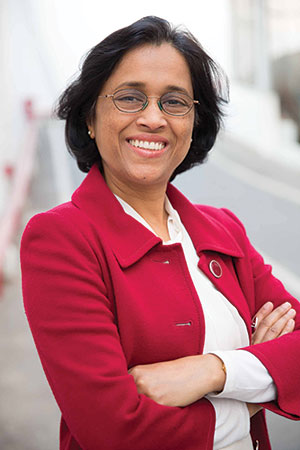 An alumna of the London School of Economics and Oxford University, Prof. Geeta Gandhi Kingdon is the chair of education economics and international development at the Institute of Education of University College, London. Moreover, she is the president of the K-12 City Montessori School, Lucknow (CMS), acknowledged by Guinness World Records as the largest school worldwide (18 campuses with an aggregate enrolment of 56,500 students mentored by 2,200 teachers). CMS is ranked the #1 co-ed day school in Uttar Pradesh (pop.215 million) in the EducationWorld India School Rankings 2018-19.
An alumna of the London School of Economics and Oxford University, Prof. Geeta Gandhi Kingdon is the chair of education economics and international development at the Institute of Education of University College, London. Moreover, she is the president of the K-12 City Montessori School, Lucknow (CMS), acknowledged by Guinness World Records as the largest school worldwide (18 campuses with an aggregate enrolment of 56,500 students mentored by 2,200 teachers). CMS is ranked the #1 co-ed day school in Uttar Pradesh (pop.215 million) in the EducationWorld India School Rankings 2018-19.
What are your three recommendations to the new government to sharply upgrade K-12 education in India?
First, I would advise the new government to change the way schools are funded. Instead of funding schools by way of grants, government should fund students directly through direct benefit transfers (DBT). Households/parents should be given education vouchers of various denominations to ‘purchase’ education in schools of their choice. The voucher system would create competition between schools — to provide good education to attract and retain voucher-bearing students. The BJP/NDA government has already successfully implemented several DBT schemes. An educational DBT system would provide the benefit of government subsidy directly to the intended beneficiary i.e, parents/children rather than school managements.
Secondly, I would advise the new government to separate its roles as funder, provider and regulator of government schools. Government schools are unsuccessful because in its regulatory capacity, government is unlikely to impose punitive sanctions on its own schools. The Right of Children to Free and Compulsory Education Act, 2009 (aka RTE Act) is a prime example of this contradiction. S.19 of the Act mandates that all schools — government and private — are obliged to fulfil the stipulated infrastructure norms. But penalties and forcible closure for violating the stipulated norms are only applicable to private schools. The Act exempts non-compliant government schools from penalties and closure permitting continuing inefficiency in them. Appointing an independent regulator would tighten governance in government schools.
Also, it is important to separate the government’s role as financier of education from provider of education. The history of the past 70 years has clearly established that government — especially state governments — has not done a good enough job of providing education. Public-private partnership (PPP) in which private institutions, including NGOs provide education funded by government would work much better. There are exemplary PPP models all over the world for the government to study and adapt to Indian conditions.
Thirdly, I would recommend that government recognition of private schools, including private budget schools, should be based on outcomes, not inputs. At present under s.19 of the RTE Act, government recognition of a school is dependent upon it complying with a range of infrastructural input norms. Instead, recognition and licensing of private schools need to be based on students’ learning outcomes which can be objectively measured. Infrastructural inputs have no proven relationship with learning outcomes — skills and knowledge — which is what parents and employers care about.
Are you in favour of the appointment of a non-partisan Education Commission of India at the Centre and in the states to implement the imminent New Education Policy and regulate and adjudicate all matters related to education?
Yes. I believe it’s high time education of India’s children becomes non-partisan to prevent it becoming a political or ideological football. Placing this important subject under an independent non-partisan Education Commission would also protect it from the short-termism of five-year governments at the Centre and in the states.






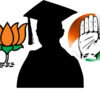








Add comment